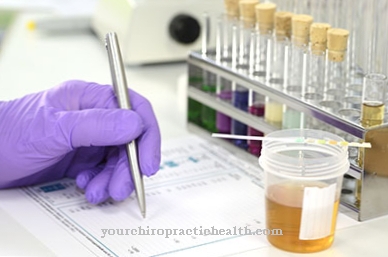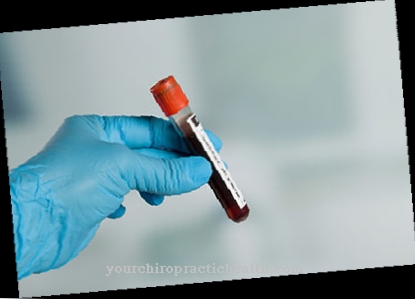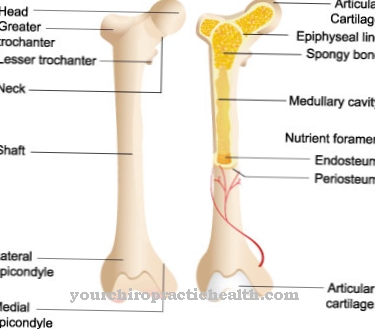At a Biotinidase deficiency it is a very rare hereditary metabolic disease. It arises due to a genetic defect in the enzyme biotinidase. About one in 80,000 children is born with such an enzyme disorder. Newborn screening will help make a diagnosis.
What is Biotinidase Deficiency?

© k_e_n - stock.adobe.com
The biotinidase deficiency, or BTD for short, belongs to the group of rare hereditary diseases. Like almost all metabolic diseases, the enzyme defect is inherited as an autosomal recessive trait. This means that both parents are carriers of the disease, but not affected by it themselves. The cause of a biotinidase deficiency can be traced back to mutations in the BTD gene, which is located on chromosome 3.
It was not until the 1980s that the biotinidase defect was discovered as the trigger for this rare metabolic derailment. Biotinidase is an enzyme. It has the task of preparing the free biotin contained in the chemical compound biocytin, which is not bound to a protein, so that it can be used by the organism. This is important both when recycling biotin in the body and when absorbing biotin through food.
causes
If the enzyme cannot do this work or only inadequately, the biocytin is lost through the kidneys. As a result, biotin stores in the body are reduced over time, even if sufficient biotin is taken in with food. This leads to a biotinidase deficiency over time. A distinction is made between two forms of BTD. The severe biotinidase deficiency, which has an enzyme activity of less than ten percent. And the partial deficiency, which leads to an enzyme activity of ten to 30 percent.
Biotin, formerly known as vitamin H or skin vitamin, is important for the fatty acid metabolism, has an influence on cell growth and is responsible for the formation of new glucose. The effects of a BTD deficiency are serious and primarily affect organs with a high metabolic intensity. This includes the brain, the muscles and the immune system.
Symptoms, ailments & signs
The consequences of a biotinidase deficiency are seizures, development deficit, hearing loss, lack of muscle tension, ataxia, degenerative disease of the optic nerve and breathing problems. The symptoms develop insidiously from infants to toddlers. They can occur over the course of two weeks to three years.
Diagnosis & course
Since four important enzymes are affected in a biotinidase defect, the symptoms vary greatly from patient to patient. Also, not every symptom occurs in every child. Therefore, a biotinidase deficiency must be diagnosed as soon as possible in order to be able to treat it. In the Federal Republic of Germany a corresponding examination has been part of the newborn screening since 2005, the costs of which are borne by the statutory health insurance companies.
If BTD is suspected, the metabolic disease can be detected with a photometric biotinidase test. A blood analysis in newborns is essential for this. This is done on the third day of life by means of a blood sample, which is usually taken from the baby's heel, more rarely from the vein. The blood is evenly distributed on a filter paper card and dried for one hour at room temperature.
Then the sample goes to the laboratory. However, this first test does not give a definitive diagnosis. Because abnormal blood values are relatively common in infants. Especially in premature babies, fever attacks or during penicillin treatment. In addition, the symptoms of a BTD are also similar to those of other metabolic diseases. To be on the safe side, another blood test will be done five days later.
But even then it is not yet entirely certain which metabolic disease is really involved. Because the genes on chromosome 3 are also associated with other genetic diseases. There are more than 60 known mutations that cause an enzyme defect. A genetic test is therefore used. The blood diagnosis is secured with this genetic analysis.
Complications
A wide range of complications can occur as a result of a biotinidase deficiency. Depending on the severity of the disease, the deficiency can lead to movement disorders such as ataxia, hypotension or spastic paresis. In addition, the risk of epilepsy-like seizures, infections and inflammations such as dermatitis or conjunctivitis increases.
This can lead to loss of appetite, weakness and fatigue, but also hair loss and serious disorders of the immune system. Hearing loss and eye damage such as retinal degeneration or visual field restrictions also often occur. At an advanced stage, a biotinidase deficiency can cause further complications.
If there is a partial biotinidase deficiency, atopic or seborrheic dermatitis often occurs. In addition, flu-like infections usually occur, which, in conjunction with the already weakened immune system, can lead to serious consequences such as heart attacks or circulatory collapse. Organ failure and consequent death of the patient rarely occur as a result of the deficiency.
The complications of the hereditary disease usually occur shortly after birth and can lead to severe brain damage, coma and death. Serious consequences of this kind can be avoided through lifelong treatment with biotin.
When should you go to the doctor?
As a rule, a doctor should be consulted immediately in the event of a biotinidase deficiency in order to avoid complications and other late effects. In most cases, the biotinidase deficiency manifests itself through seizures, which are associated with severe pain.
Should these seizures or epileptic seizures occur for no particular reason, a doctor must be consulted in any case. Slow hearing loss and disturbances and delays in development can also indicate a biotinidase deficiency and should be examined by a health professional.
In many cases, those affected by the biotinidase deficiency also suffer from vision loss and difficulty breathing. The complaints and symptoms of this disease are insidious and usually do not appear suddenly. For this reason, especially in children, regular medical examinations are necessary to avoid complications.
As a rule, a general practitioner can be consulted if a biotinidase deficiency is suspected. The biotinidase deficiency can be determined by a blood analysis so that treatment can also be initiated. If the parents or relatives experience psychological problems, a psychologist should also be consulted.
Doctors & therapists in your area
Treatment & Therapy
The disease cannot be cured because its cause is genetic. But the prognosis is very good if therapy is started before the onset of symptoms and if it is carried out consistently.
The treatment is simple and consists of the daily administration of a biotin tablet, which, however, has to be lifelong. The patients are cared for closely in a special metabolism center. This includes regular metabolic monitoring as well as eye and hearing checks.
Outlook & forecast
The biotinidase deficiency basically has a poor healing prospect. The genetic disease is considered incurable. Legal requirements prohibit doctors, researchers and scientists from being allowed to intervene actively in human genetics. Nevertheless, thanks to medical progress, it has been possible to find a very good treatment method.
With timely drug treatment, the patient is free of symptoms for life. In order to achieve and maintain this state of health, a comprehensive examination must be initiated at an early stage. The sooner a diagnosis is made, the sooner therapy can begin. This consists of taking one medication every day.
This is a long-term therapy and the drug must not be discontinued. Alternatively, the symptoms would return within a short period of time. By taking one biotin tablet per day, the patient can live a symptom-free life for the rest of his life.
Without medical treatment, the patient is at risk of various sequelae of the disease. These are diverse and have very different degrees of severity. In rare cases, a weakened immune system can lead to a heart attack or breakdown of the circulatory system.
Epileptic seizures can occur, which is an immense encroachment on wellbeing and quality of life in everyday life. Sufficient foods with vitamin B7 can be consumed to support the maintenance of health.
prevention
Timely therapy before the onset of symptoms is decisive for the success of the treatment of a biotinidase deficiency. Intensive education of the families plays a role here in order to make it clear to them that treatment is urgent. Because without therapy, the disease leads to lasting damage. These include malfunctions of the immune system, life-threatening metabolic disorders, brain damage that can lead to a coma and possibly even to the death of the child.
That is why the time at which therapy begins is of eminent importance. The sooner, the better the chances of the little patients. If a child already shows developmental delays, hearing damage or beginning degeneration of the optic nerve, there is a risk that they can no longer be reversed even with biotin therapy.
Otherwise, patients can expect a completely normal life with biotin therapy. Those affected should only avoid raw eggs. These contain avidin, a glycoprotein that can bind biotin. However, boiled eggs in which the avidin is no longer active are harmless. Treatment with biotin is completely free of side effects.
Aftercare
A biotinidase deficiency must be treated for life. Follow-up care focuses on regular screenings and adjusting medication to the ever-changing symptom picture. Developmental deficits that could not be compensated for in the course of therapy must also be treated with medication and behavioral therapy as part of the follow-up care.
An improvement in the state of health is usually not possible, but further progression of the disease can often be avoided. In addition, aftercare focuses on enabling the patient to lead a relatively symptom-free life. This is achieved by organizing appropriate aids for any physical disability at an early stage.
In the best case scenario, the symptoms of the skin and the metabolism recede completely. Follow-up care here focuses on regularly checking whether a relapse has developed or any unusual symptoms are occurring that require further observation. If these measures are reliably observed, patients suffering from a biotinidase deficiency can lead a relatively symptom-free life without any further complications.
After the initial treatment, parents often have to seek therapy, as bringing up an affected child can be associated with enormous physical and psychological efforts.
You can do that yourself
Biotinidase is a very important enzyme for the metabolism and the immune system because it can extract the biotin contained in biocytin, which is also known as vitamin B7. Vitamin B7 takes on important cross-sectional tasks in every cell nucleus and plays a key role in carbohydrate, protein and fat metabolism. A deficiency in biotinidase leads to a deficiency in biotin.
It is very important that the rare hereditary disease that causes the deficiency in biotinidase is recognized as early as possible - shortly after birth - in order to compensate for the biotin deficiency through lifelong oral intake with a daily tablet. Early diagnosis is so important because the biotin deficiency can cause serious metabolic damage that is no longer reversible.
An adjustment to everyday life and self-help measures are unnecessary because the daily intake of just one biotin tablet is associated with a normal life expectancy without any lifestyle restrictions. An unintentional overdose is completely harmless because the metabolism can easily further metabolize the biotin in the event of an excess.
When traveling abroad and especially when traveling long-distance, it is recommended to have a sufficient supply of biotin tablets with you so that you do not have to interrupt the intake of biotin, which could have serious and serious consequences after a short time.













.jpg)

.jpg)
.jpg)










.jpg)